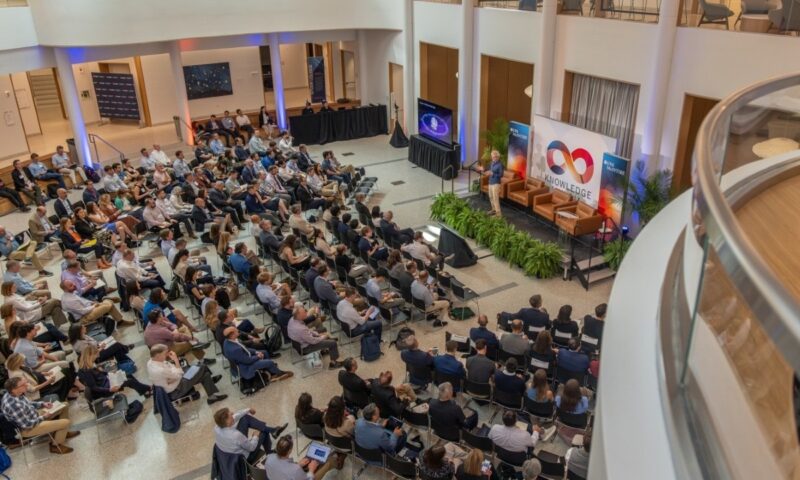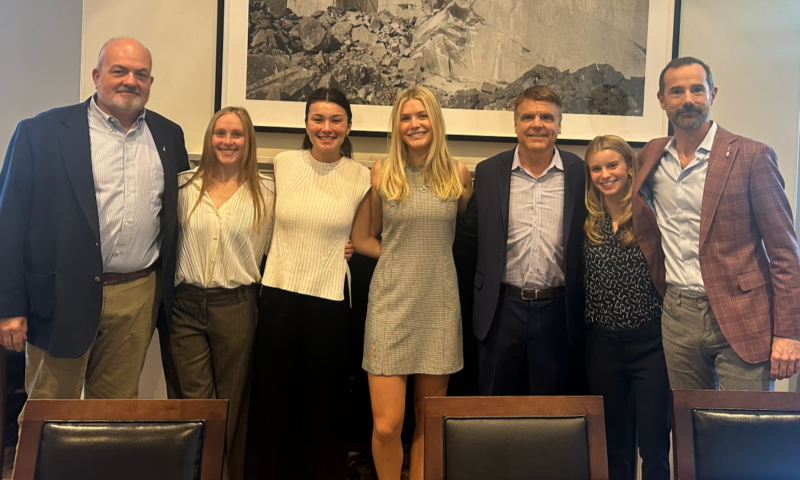Throughout the spring 2024 semester, McIntire made significant strides in its engagement with artificial intelligence (AI) by examining, adopting, and weighing many potential uses and pitfalls of the quickly developing technology. The School introduced a range of AI tools and resources aimed at enhancing productivity and learning experiences for students, faculty, and staff, featuring initiatives such as AI-focused workshops and courses focused on ethical and practical applications, an AI Advisory Taskforce, and various collaborative research projects and committees, underscoring McIntire’s commitment to staying at the forefront of innovative AI and its impact on business education.

Ryan Wright
“At McIntire, we are at the forefront of integrating AI into both our teaching and research,” says Professor Ryan Wright, Senior Associate Dean for Faculty and Research. “Our innovative AI tools enhance the educational experience by streamlining workflows and fostering creativity among students and faculty. Our AI upskilling workshops for faculty and the work of our AI Taskforce ensure that our professors are equipped with the latest knowledge and skills to effectively incorporate AI into their classrooms, enriching the learning environment.”
Noting that Commerce faculty are engaged in groundbreaking projects exploring the ethical implications and practical applications of AI, Wright states, “We are recognized as leaders not only at UVA but also on an international scale. These cutting-edge teaching and research endeavors reflect our commitment to ‘Commerce for the Common Good.’ By advancing AI knowledge and applications, we not only prepare our students to succeed, but also aim to create a positive impact on society through teaching and research, ensuring that technological advancements benefit all.”
Schoolwide Launch of AI Tools
Assisting faculty, staff, and students to be more productive, McIntire introduced the following AI tools:
- Microsoft Copilot: This generative AI service is chat-based, but also accepts image and voice-to-text prompts. As an AI-powered digital assistant, it helps users with tasks across Microsoft applications, such as Word, Excel, PowerPoint, Outlook, and Teams. In addition to helping write emails, prepare presentations, and plan meetings, it can automate repetitive tasks, suggest new ideas, and integrate data.
- Grammarly: The popular writing assistant features on-demand generative AI tools that can be used to quickly compose, rewrite, ideate, and reply. As it is contextually aware and accounts for personal writing voice and tone, it can offer relevant and personalized suggestions that respect user agency and authenticity.
- Zoom: The cloud-based web conferencing and communication platform now provides a “Meeting Summary” function. The tool allows the host to receive an emailed recap detailing their meeting after it ends.
AI Upskilling Workshops
On April 5, “McIntire Faculty GenAI Workshop: Stories from Our Classrooms,” hosted the first AI-related talk on specific use cases directly from those who teach at the Commerce School.
Moderated by Professor Stefano Grazioli, who gave an introductory talk on his experiences researching and working with AI, the workshop included the following events: “Trouble-Shooting and Customizing Content,” by Professor Sarah Lebovitz; a discussion of current University guidelines and “Prompting Strategies,” by Professor Reza Mousavi; “Better than AI: Student-AI Collaborations in Educational Writing,” by Kiera Allison; and “Utilizing ChatGPT for Machine Learning Mastery: Preliminary Findings,” by Professor Jingjing Li.

Kiera Allison, Stefano Grazioli, Sarah Lebovitz, Jingjing Li, and Reza Mousavi offered a McIntire faculty GenAI workshop.
On May 10, CMIT’s flagship event, the Knowledge Continuum, explored AI from multiple angles. It welcomed Eric Siegel, Founder of Machine Learning Week, who discussed lessons from The AI Playbook: Mastering the Rare Art of Machine Learning Deployment, and Christopher Porter (A&S ’98, M.S. in MIT ’10), SVP and CISO of Fannie Mae, held the session, “Gen AI—A CISO/Risk Executive’s Perspective.”
Course on AI Skills, Use, and Implementation

Steven L. Johnson
Newly offered as part of the Commerce for the Common Good initiative, Professor Steven L. Johnson taught a pair of courses with the same content: Ethical Application of Artificial Intelligence, for undergraduate students, and Managerial View of AI, a graduate version. The courses are dedicated to providing students with the skills to positively contribute to successful AI implementation. Both courses help student to learn about a great many facets of the technology, including the management of AI; potential benefits and limitations for organizations; cultural assumptions and potential intercultural barriers in AI design and use; identifying sources of algorithmic bias in AI use and implementation; approaches to avoid or remedy AI bias; ethical frameworks; and accountable autonomy.
Students Excel in AI Hackathon

Chip Ransler
As part of AI Week in Washington DC, Professor Chip Ransler led students to the gHacks hackathon with Google Public Sector. Student groups collaborated with a Google engineer mentor about potential strategic uses of AI to address challenges in the Commonwealth posed by wildfires and flooding, bridging the gap between technology and public service. Winning proposals from the McIntire students approached the problem by focusing on different aspects of the natural disasters and ways to support stakeholders, ranging from emergency workers to residents and vulnerable communities.
Professor Stefano Grazioli Gives AI Talk in Northern Virginia
Building on the theme of McIntire’s 2023 Fall Forum on AI’s business value, Stefano Grazioli gave an insightful talk on the subject to Northern Virginia alumni, parents, and friends on Feb. 22. The evening was highlighted by his mini-lecture and a discussion about the opportunities the technology brings to all industry, as well as the future of ethics, privacy, empathy, misinformation, labor, and more.
Executive-in-Residence Zack Kass

Zack Kass
Zack Kass, AI Futurist, acclaimed speaker, and global adviser on AI strategy for governments and companies, joined the McIntire School as an Executive-in-Residence for 2024. In this role, Kass collaborates with faculty, staff, and alumni, helping to examine how to stay ahead of developments in AI while concurrently upskilling faculty to bring that knowledge into the classroom. This includes developing a Commerce Essentials micro-course about utilization of generative AI in early careers that will help undergraduate, graduate, and young alumni students understand how to leverage generative AI in the workplace. Other activities for Kass entail meeting with students via guest lectures, workshops, seminars, and networking events and participating in some of the School’s signature events; helping the School build its network of academic and industry connections surrounding AI; and contributing to relevant research initiatives.
AI Advisory Taskforce Established
Seeking to advance the role of AI in business education and practice by fostering a culture of innovation, ethical awareness, and continuous learning, the Commerce School formed an AI Advisory Taskforce, a community of teacher-scholars creating high-quality research on the subject. The taskforce is charged with ensuring that McIntire remains at the forefront of AI integration in education and research, providing students, faculty, and alumni with the tools and knowledge necessary to excel in an AI-influenced business landscape.
AI Advisory Taskforce members include Professors Kiera Allison (Management Communications), Stefano Grazioli (IT and Innovation), Bryan Lewis (CIO and Instructor), Yi Liang (Accounting), Christi Lockwood (Management), Peter Maillet (Global), Roger Martin (Undergraduate Program Director), Reza Mousavi (IT and Innovation), and Robert Parham (Finance), as well as staff member Amanda Morris (Director for Centers and Research).

Bryan Lewis, Yi Liang, Christi Lockwood, Peter Maillet, Roger Martin, Amanda Morris, and Robert Parham joined Kiera Allison, Stefano Grazioli, and Reza Mousavi on the AI Advisory Taskforce.
Advisers Kent Collier (McIntire ’03) of Reorg, Joe Harrington of PwC, Zack Kass, formerly of OpenAI, Erik Moreno of Sony, Ryan Stevens (McIntire ’12) of Clutch, Don Vu (McIntire ’98) of New York Life, and Kajal Wood of Capital One are joined by current undergraduate students Jake Beyer (McIntire ’25) and Carson Breus (McIntire ’25, A&S ’25), as well as recent grad Montana Showalter (McIntire ’24) and current graduate student Kyle Woodson (McIntire ‘24, M.S. in Accounting ‘25).
More AI-Focused Committee Roles
Reza Mousavi is part of the University’s GenAI Taskforce created through the Provost’s Office, as well as its GenAI Faculty Training Committee, led by Vice Provost Brie Gertler. The goal of the committee is to pique interest in generative AI at the intersection of teaching and learning, highlighting its current and potential impact on higher education, to train instructors with GenAI tools, to integrate or limit its use in assignments, and to explore the many implications of AI, including its relationship with academic integrity and UVA’s Honor Code.
Jingjing Li is a member of the UVA Provost’s Task Force on AI Research, a group centered on faculty from across Grounds undertaking research involving AI and machine learning. As many UVA researchers are among the leaders in these areas and there has been substantial faculty hiring of AI research leaders, the organization primarily focuses on faculty hiring. Representing a dedicated, centralized effort to organize, grow, and promote research involving AI, the committee calls for creating a center for AI research at UVA and suggests activities for such a center, including a fellows program, development of focused AI research hubs, supporting data consortia, forming interdisciplinary AI research, and more.
AI Research
Jingjing Li and Reza Mousavi are also collaborating with four of their University peers from the Department of Psychology on “UVAi Vanguard: Transforming UVA’s Academic Landscape with AI & Large Language Models,” a project supported by a three-year grant of $112,800 awarded by the Jefferson Trust. The project connects thought leaders from the School of Commerce and the College of Arts & Sciences on impactful technologies.
Li, the Andersen Alumni Associate Professor of Commerce and Associate Director of McIntire’s Center for Business Analytics, recently earned an Analytics Resource Award for her project, “Responsible-by-Design: Combating Biases in Generative AI Applications,” from the UVA Data Analytics Center. The University’s hub for assisting researchers across Grounds will provide Li with the essential infrastructure her project requires to securely store and process proprietary and public large-scale datasets.
As part of UVA’s Darden-Data Science Collaboratory (DCADS) Fellowships for AI Research, Steven L. Johnson is teaming up with UVA Data Science Professor Tom Hartvigsen and Carnegie Mellon University Professor Maarten Sap to explore identifying implicit bias in natural language using large language models. Sarah Lebovitz is partnering with Data Science Professor Mona Sloane and Darden Business Professor Roshni Raveendhran to investigate the application of AI in recruiting.
The Journal of the Association for Information Systems (JAIS), an “A” publication for the School’s IT&I Area, recently released a special issue on “AI for Knowledge Creation, Curation, and Consumption in Context,” which includes “Knowledge Management Perspective of Generative Artificial Intelligence,” an editorial by Professor Dorothy Leidner, Mousavi, and a co-author, and “Democratizing Knowledge Creation Through Human-AI Collaboration in Academic Peer Review,” an editorial by Professor Suprateek Sarker and co-authors.

Suprateek Sarker
Sarker and three co-authors also published “Pathways for Design Research on Artificial Intelligence,” in the Information Systems Research journal. The article addresses some of the challenges faced in publishing design research related to AI and articulates viable paths for publishing such work. Highlighting major impediments and using large language models to underscore these impediments, Sarker and his co-authors propose solutions using several example articles to illustrate how the pathways can be followed for different types of AI-related design artifacts.
Faculty AI Expertise in the Media

Dorothy Leidner
Dorothy Leidner was quoted multiple times during the spring semester for her extensive knowledge about artificial intelligence and the ethics behind the technology. In media partner content at Financial Times, she weighed in on companies balancing adoption with ethical and equitable concerns (“Setting the Standard: Trust and Governance’s Role in AI Readiness”). She shared her thoughts with CNN on how educators can effectively and ethically use AI in grading (“Teachers Are Using AI to Grade Essays. But Some Experts Are Raising Ethical Concerns”). Additionally, Leidner was quoted in an AP article examining emotional attachment to AI chatbots.
At the start of 2024, Commerce faculty gave their predictions for the year in a UVA Today news item that mentioned AI in relation to writing, as an information source, and as integrated into cybersecurity.
Other AI-Related Initiatives at McIntire
Lastly, as the spring semester finished up, the inaugural McIntire Summer Community Read began, kicking off summer 2024 with the schoolwide reading of Co-Intelligence: Living & Working with AI by Ethan Mollick.
The book challenges readers to “utilize AI’s enormous power without losing our identity, to learn from it without being misled, and to harness its gifts to create a better human future.” Mollick’s book urges engagement with AI “as co-worker, co-teacher, and coach,” discussing “its profound impact on business and education, using dozens of real-time examples of AI in action,” and reinforcing why humanity must learn to think and work together with smart machines.



